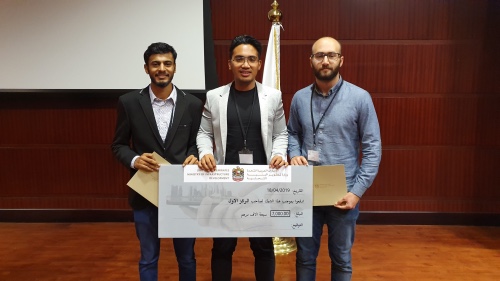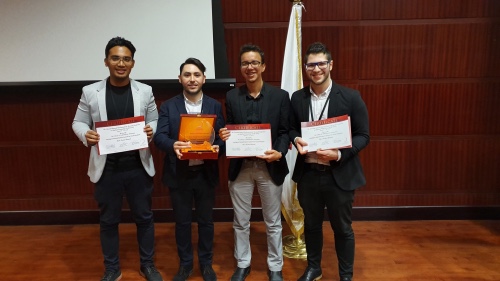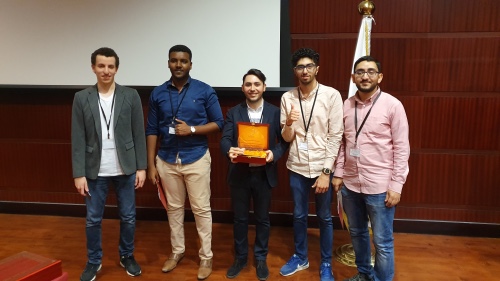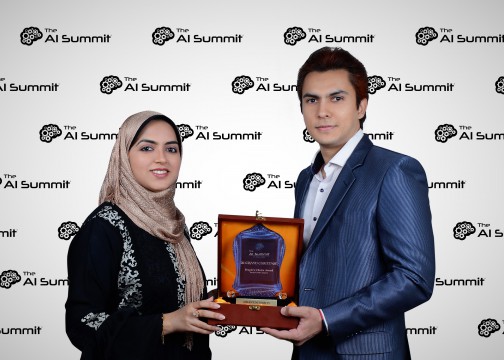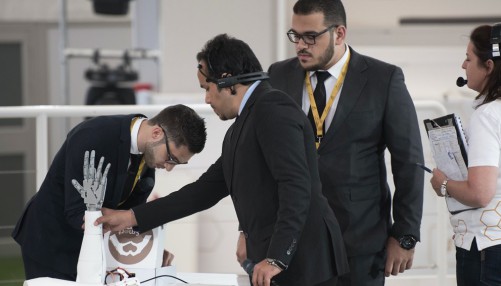Do AU's Engineering Students Have “Secret Formula” for Success?
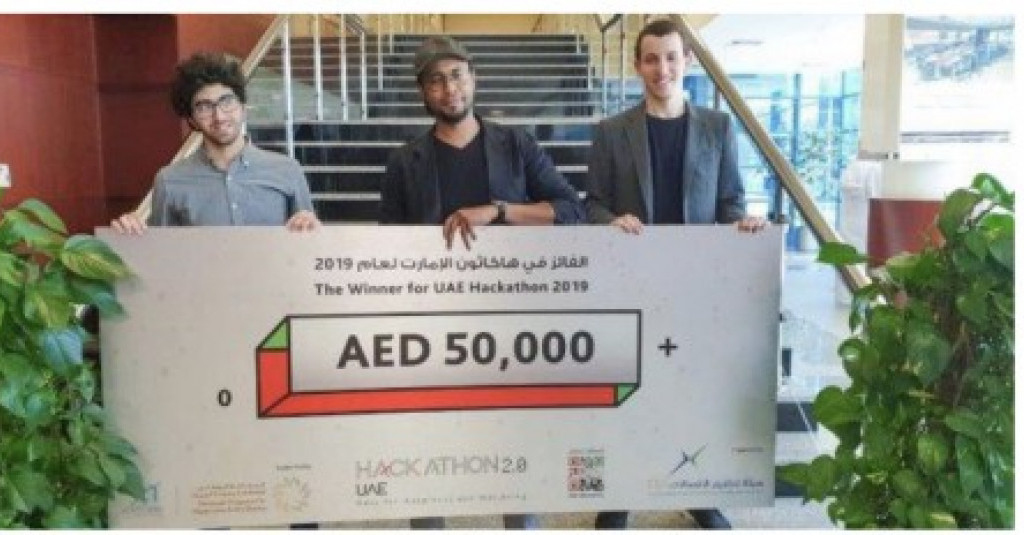
When Ajman University engineering students travel to competitions to test their ideas and evaluate their innovations, they bring a “secret formula” for success along for the ride. With first-place honors in 44 events since 2015, their winning streak is now, without a doubt, a legend in the UAE and GCC. The only question is how the students keep making it happen, time after time.
Ajman University Chancellor Karim Seghir says the pursuit of excellence is a trademark of the historic and pioneering institution. “Since 1988, AU has been a destination for young people on a mission to improve the world, as well as themselves,” he explains. “Whenever it happens, which is an increasingly frequent occurrence, we honor the inventions and the inventors. We’re also committed to investing in the resources to help them succeed.”
According to Dr. Faher Hayati, Dean of AU’s College of Engineering and Information Technology, the secret to this success comes down to a time-tested recipe for youth empowerment. “We build self-confidence and multidisciplinary teamwork here,” he explains. “It is not uncommon to see electrical engineering students working with biomedical and information technology students on a project that involves the latest in digital technology with direct relevance to market needs. Supporting and complementing each other produces wonderful results.”
Case in point is the Smart Assistive Glasses for Alzheimer Patients, created by a team of electrical engineering students – Mohamed Ait Gacem, Saifelddin O.S. Alghlayini, Muaid Hafiz, and Ahmad Ghazal. The concept earned top prize in a scientific poster competition at the 2019 Advances in Engineering Technology & Sciences Multi-Conferences in Dubai. Highly acclaimed by judges and competitors alike, the team’s project conceives of an augmented-reality screen that performs basic caregiver functions as a way to prolong the independence of people in the early and middle stages of dementia.
Mr. Saifelddin says winning this award was the highlight of his academic journey thus far at AU. Going forward with graduate school, he wants to follow in the footsteps of his Smart Glasses’ project supervisor Dr. Mustahsan Mir, Professor of Electrical Engineering. In 2005, Dr. Mustahsan established AU’s chapter of the Institute of Electrical and Electronics Engineers (IEEE). This year, for 10th consecutive time, AU students won the maximum number of prizes in the UAE’s IEEE Student Day.
“My ambition is to be one of the best electrical engineers in the region and to continue my higher studies,” Mr. Saifelddin explains. He says the fact that AU always celebrates the work of its distinguished students adds further motivation.
“The student team behind Smart Assistive Glasses deserves the recognition and awards they’re earning,” Chancellor Seghir remarks. “It’s a brilliant approach to managing one of the world’s most vexing issues. We are so proud of our students for their innovation and compassion.”
Deep compassion for society also sets AU’s young aspiring engineers apart from the rest. “Our students are always eager to make a difference, which is shown in their innovative ideas targeting humanity and a better future for everyone,” says Eng. Wessam Sheheib, who has twice won AU’s annual award for best teaching assistant.
Ali Mohammed, who graduates from AU with a degree in Electrical Engineering this year, firmly believes that engineering is a field that solves most of our problems in the world with an invention or a solution that can affect actual people’s lives for the better. “I have always been self-motivated to become a better person, a person who perhaps can make a difference one day, and that has been my inspiration to try and excel in everything I do and not to give up when it gets tough,” he says.
His cohorts agree about the importance of staying focused no matter what happens – win or lose.
“I believe that what we have in common is aiming high and using the knowledge we accumulate throughout different challenges as opportunities for self-improvement,” explains Mohamed Ait Gacem, who also graduates this year. Along the way, he’s also learned that accepting constructive criticism can empower the next stage of any project.
“Although I’ve greatly benefited from all the competitions I've participated in and won, it was the one competition that I didn’t win a few years ago that gave me the greatest lessons. I was able to identify the weaknesses that existed in the idea and to realize the importance of being flexible and adaptive in pitching ideas to different audiences.”
The payoff for patience and resilience is worth any setbacks and hardships. Earlier this year, Mohamed Ait Gacem and Saifeddin O. S. Alghlayini, along with Ahmed Saif Eldeen Khalil, took home highest honors in the UAE Hackathon for their concept, “VitaCAM,” a smartphone application that uses artificial intelligence to detect vitamin deficiencies in humans. Through photographic images of the eyes, lips, tongue, VitaCAM evaluates a participant’s condition and issues a diagnosis. The three student inventors earned AED 50,000 in prize money for their potentially life-saving innovation.
Another idea that has been earning awards and attention across the region since it was developed in 2015 is the “Smart Arm,” developed by three biomedical engineering students at AU. Inspired to help millions of people around the world who have suffered limb loss, their “Smart Arm” offers an affordable, state-of-the-art and customizable solution to an expensive and devastating problem.
“The uniqueness of our project is that it’s non-invasive, and can be tested easily without any complications,” says Waleed Bin Nasi, now an AU alumnus, who developed the Smart Arm with cohorts Mohamed Abdalla Agam and Obida Al Najjar. Their invention has won multiple competitions, been featured in major media outlets, and earned seed money from AU’s Innovation Center for incubation and acceleration.
The students tackled conceptual, design and software challenges under the mentorship of Dr. Mohamed Nasor, Chair of Biomedical Engineering at AU, and with the assistance of Eng. Iyad Naim. Literally working hand in hand, the Smart Arm Team engineered the prototype to respond to 16 discreet sensors attached to a headset. Each sensor interprets electrical activity in the brain and sends wireless messages to the mechanical fingers.
AU students are always encouraged to go the extra mile – and to go out of their way to learn more and do more than is ever expected. “Our students have shown that they are willing ability to learn a variety of skills that are outside engineering scope to make sure they polish and showcase their projects in the best possible way,” explains Eng. Wessam, who goes the distance with his students.
Having role models in the classroom also creates an environment of success. In addition to the leadership of teachers like Prof. Mustahsan and Eng. Wessam, practicing what you preach comes naturally to Lecturer Tazeen Sharif – herself a graduate of AU’s engineering program.
With fellow AU alumni Sameer Sharif and Shahin Basiratzadeh, Eng. Tazeen emerged from the 2019 A.I. Grand Challenge in Dubai with the “People’s Choice Award” in the category of Artificial Intelligence for Social Good. Called Sense7, their project also utilizes a pair of smart glasses to interpret visual stimuli as auditory instructions. Sense7 has been tested successfully in vocational training sessions with blind individuals and could eventually help them enter the workforce. Along with top honors, Sense7 was awarded high-profile tech internships worth USD 35,000 to have the prototype developed further.
In 2018, Sense7 earned top honors in the regional category of the QS Reimagine Education Awards – considered the “Oscars” of teaching and learning – in San Francisco, California. Of more than 1184 entries, only 17 including Sense7 earned distinction in the prominent global competition.
If there is a formula to all this success, says Dr. Khaled Assaleh, Vice Chancellor for Academic Affairs, “it is the blend of hands-on coursework, inspirational teachers, high-tech classrooms and labs at AU.”
But the secret ingredient, Dr. Khaled asserts, “is our students’ thirst to win.”
